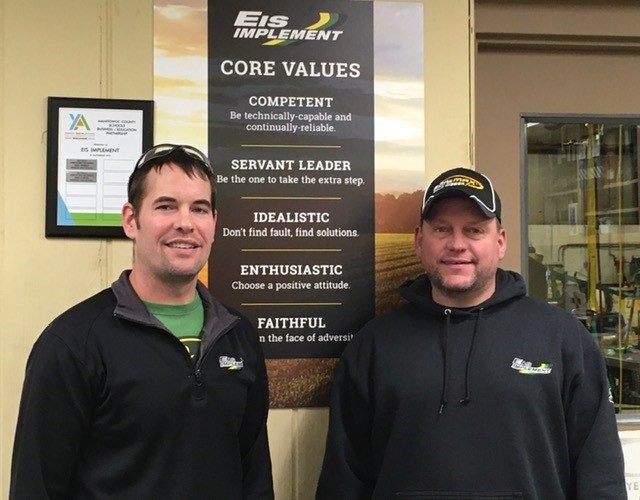Pictured Above: Jon Eis (left), chief operating officer for Eis Implement of Two Rivers, Wis., and Scott Chalupny (right), service manager, say it’s important to show a career path when working with student interns that you hope will stay at your dealership after graduation.
Eis Implement’s Service Manager Scott Chalupny is an intern success story. He was sponsored by Eis Implement and attended the John Deere Agriculture Equipment Technology program at Madison (Wisconsin) College 24 years ago and has now been the dealership’s service manager for 13 years.

Chalupny also now leads the high school internship program at the dealership, which has been in place for about 10 years. It’s a “grow-your-own” approach to filling the need for service techs that other dealerships are also trying. Chalupny and Jon Eis, the dealership’s chief operating officer, share what is working for them. Eis Implement is a single-store John Deere dealership based in Two Rivers, Wis., and also carries STIHL, Wacker Neuson, Landoll, H&S Manufacturing, Kuhn and Soil-Max.
Step 1. Interview the Applicants
The dealership works with the Manitowoc County Youth Apprenticeship Program and a local high school, generally interviewing about 8 students the summer before their junior or senior year.
“We go through our normal interview process with them, just like they would be a regular hire. I also look at their grades. If they are struggling in school, that’s a red flag for me. Some are looking to get into the truck or automotive side of mechanics, but I try to select the ones that are looking to get into the agricultural side of mechanics. I also ask them about their plans for after high school, whether they want to enter the workforce or plan to attend a 2-year or 4-year college,” says Chalupny.
They also talk through hours of availability, working around the student’s class schedule (morning or afternoon hours). The interns generally work about 15 hours a week along with every third Saturday. Some continue full-time hours the summer following the school year.
Step 2. Offer a Variety of Experience
Chalupny does the initial orientation and then the student rotates among the service technicians to ensure they get a variety of experience and to uncover their skills and interest. He lets the service techs teach in their own ways. “Some techs have them stand back and watch to get a clearer idea of the repair and other techs get them involved right away,” he says.
Typical jobs might include equipment set-ups and maintenance on lawn-and-garden equipment. For repairs on large ag equipment, they might clean the machine, gather tools and shadow the tech, helping with what they need. Chalupny also has them spend time in the parts department, such as helping with inventory or putting away stock, and they also do some field runs with the precision ag technicians.
Step 3. Show a Career Path
During the internship, the team at Eis Implement tries to highlight a career at the dealership, even talking through what their wages could look like if they stayed with the dealership for 5 years.
“Most of the time you can tell if it’s going to be a fit for them before they’re out of high school. Then there are some students that when they’re done with their year, they want to do something else. We try really hard to look at the individual and what’s important to them. If they have the right skills, we encourage them to consider going to college. If they don’t like it, they can come back. The door is always open,” says Chalupny.
There are three technical colleges in the dealership’s area that have an agricultural-based program, with one in particular putting more of an emphasis on John Deere.
Step 4. Offer Ongoing Support
For the student who does go on to a tech school but stays working at the dealership on the weekends, they sometimes offer funds toward John Deere-related manuals. They don’t offer tuition scholarships like other dealerships do, which are linked to working at the dealership for a time after graduation.
“It works out better for us if there’s no commitment. We definitely try to keep the students on after graduation, but if it doesn’t work out, it’s not a loss,” Eis says. He continues to think about the best approach and is considering maybe some support toward a student loan after a certain length of employment.
“I’m not sure they would be interested in that. Now, we’re trying to be competitive on wages and provide a positive culture more than anything else,” Eis says.
Step 5. Expand the Reach
About 40% of the interns over the years have stayed with the dealership for some time or continued working in the industry. Eis says that success rate may go lower as the generations become less connected to agriculture. He is looking at ways to expand the program. For instance, he has worked with the Chamber of Commerce to gather contacts for other high schools in the area and he hopes to approach them and make presentations to the students. He is also considering outreach to students in robotics classes or clubs.
Eis offers this advice for other dealers, “You have to keep an open mind. Every student is not going to work out the way that you have hoped. Do what’s right for them, help them in their personal success and paint a picture of what their future could look like at the dealership.”
Related Content: John Deere, Wisconsin Dealers Donate to Ag Education Center





Post a comment
Report Abusive Comment